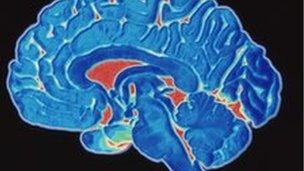Age of criminal responsibility 'too low', experts say
- Published
- comments

Some parts of the brain are not fully mature "until at least the age of 20"
Advances in neuroscience suggest the age of criminal responsibility - 10 in England, Wales and Northern Ireland - might be too low, according to a study.
The Royal Society report considers areas where recent scientific findings could have an impact on the law.
At the age of 10 parts of the brain connected with decision-making and judgement are still developing, the study says.
But it says there are limits to how the science can be used in court.
Professor Nicholas Mackintosh, who chaired the working group that compiled the study, said: "There's now incontrovertible evidence that the brain continues to develop throughout adolescence."
He said some regions of the brain - including parts responsible for decision-making and impulse control - are not fully mature "until at least the age of 20".
"Now that clearly has some implications for how adolescents behave," he said.
The report notes the concern of some neuroscientists that the current age of criminal responsibility in the UK is set too low. In most European countries it is far higher - 18 in Belgium and 16 in Spain.
It also suggests that because of differences between individuals a cut-off age may not be justifiable.
'Fresh look needed'
Professor Mackintosh said it was for policy makers to decide on altering the age of responsibility, but the changing science meant it should at least be reviewed.
He said: "I think the Royal Society is in a position to present the scientific evidence - other people need to draw conclusions from it.
"But the extent to which the scientific evidence wasn't well known 10, 15 years ago, then it suggests that things do need looking at again."
The study identifies areas where expectations of what neuroscience can deliver in courts should be handled with caution.
Claims that criminals can be identified by imaging their brains, or that there could be a gene for psychopathy are "wide of the mark", it says.
In Scotland children cannot be convicted until they are 12. In Northern Ireland, a review of the youth justice system recommends increasing the age to 12.
Calls from England's children's commissioner to raise the age of criminal responsibility from 10 to 12 were rejected, external by the government in in March 2010.
At the time, Maggie Atkinson said most criminals under 12 did not fully understand their actions.
She also said civilised society should recognise that children who commit offences needed to be treated differently from adult criminals.
- Published26 September 2011